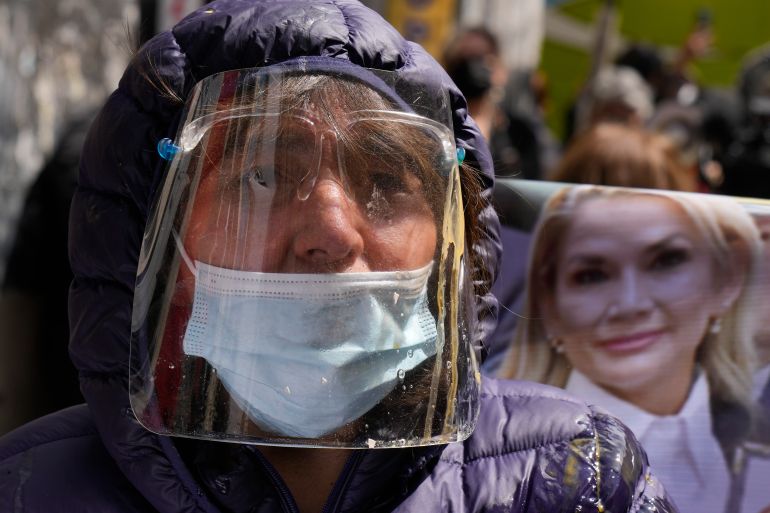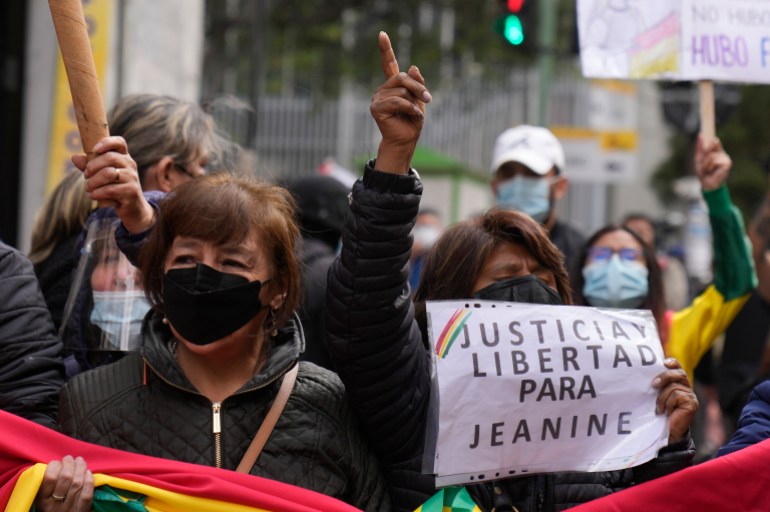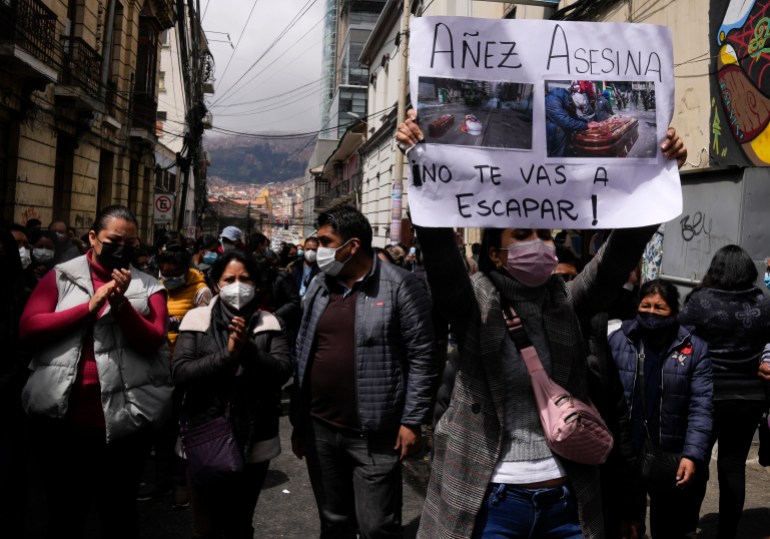Trial against Bolivia’s former president Jeanine Anez suspended
Anez could be sentenced to 12 years in prison if she is found guilty of unconstitutionally assuming the presidency.

The trial of former interim president of Bolivia Jeanine Anez, who has been accused of orchestrating the removal of her predecessor Evo Morales, was suspended by a court in the administrative capital La Paz.
The court began virtually on Thursday due to COVID-19 restrictions. But amid interventions and technical failures, Anez’s lawyers requested that the trial be held in person, and secured a postponement of the trial. A new date was not set.
Keep reading
list of 3 itemsIn Pictures: ‘People of the Water’ try to survive loss of lake
In Pictures: The Bolivian girl dreaming of boxing glory
Anez, 54, a conservative leader, has been held in prison for 11 months in pre-trial detention and could be sentenced to 12 years in prison if she is found guilty of the charges of unconstitutionally assuming the presidency in November 2019, following the removal of Morales, who fled into exile following 14 years in power. His supporters say it was a coup.

Anez, who was detained in March 2021, has denied the allegations and says she is a victim of political persecution.
“I assumed the presidency of Bolivia without asking for it, without looking for it and much less expecting it… with the only mission to call new elections and pacify a country in convulsion,” Anez said on Tuesday.
Duelling protests took place outside the court on Thursday. One group of Anez’s supporters demanded her release, while another called for her conviction.
Carolina Ribera, Anez’s daughter took part in the protest, wearing a mask reading, “Justice for Jeanine” and a T-shirt with the message “It was constitutional succession”.
Morales’s Movement Toward Socialism won the 2020 elections with 55 percent of the vote. And Bolivia is now governed by President Luis Arce, Morales’ chosen candidate. Anez had dropped out of the election after plunging in the polls.
But there have been doubts over the independence of Bolivia’s judicial system.
Last year, the United States said that it was concerned about increasingly “anti-democratic behaviour and the politicization of the legal system” in Bolivia following the arrest of Anez and other officials from her government.
The European Union, as well as Bolivian and international human rights organisations, have also expressed concerns.
On Tuesday, a group of 21 former Latin American presidents asked the United Nations to visit Anez and investigate potential “abuses of power” in her treatment.
Arce’s spokesperson Jorge Richter said that Anez is being tried for the crimes of violating laws related to constitutional and legislative procedures for the appointment of a head of state.
“Anez, together with the people who supported her, transcended those limits of institutional democracy, of the constitution and of the popular will and that today is what is going to be judged,” he said.
Anez’s lawyer, Luis Guillen, has accused authorities of bias. He also argues that a former president should not be tried in a civilian court but rather face a trial of responsibilities in Congress.
“An ordinary court cannot decide what is constitutional,” he said.
Observers say the plaintiffs in the case are the government, the public prosecutor, and Congress – all of whom are dominated by the ruling Movement Toward Socialism party.

“This is a political trial being carried out by the government of President Luis Arce,” said political scientist Carlos Cordero at San Andres University.
“It’s a way of establishing a political sanction for those that dared to be adversaries at a time of crisis for the Movement Toward Socialism.”
Anez is also accused of genocide over two incidents in November 2019 in which a total of 22 people were killed during clashes with the police. The victims were supporters of Morales.
A group of experts commissioned by the Inter-American Commission on Human Rights and the government said the people were killed in “massacres” carried out by security forces.
Meanwhile, Anez, who was a little-known senator when she proclaimed herself president of Bolivia with the support of the Armed Forces, went on a hunger strike on Wednesday protesting a legal process that, she says, is riddled with irregularities.
In August last year, she tried to take her own life while in prison.
“I am desperate to see a country without justice or law, that the international community understands that justice belongs to Evo Morales and Luis Arce,” she wrote in a letter. “They won’t be able to hide from history the fraud they committed.”